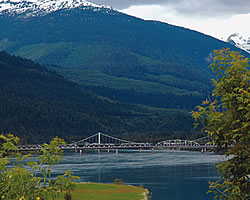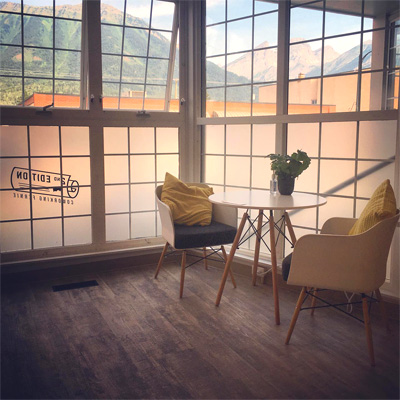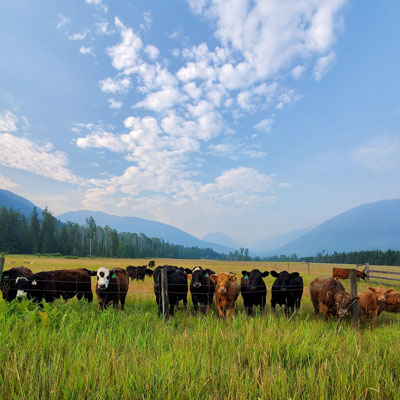Is Revelstoke too attractive?
Revelstoke is like many B.C. communities becoming dependent on the lucrative tourism market

The mighty Columbia River, the majesty of the rugged Monashee Mountains and lush vegetation surround Revelstoke — Tanya Laing Gahr photo
In many respects, Revelstoke is representative of many of B.C.’s communities. Like many evolving towns and cities in the province, Revelstoke’s economy is primarily resource-based: forestry, mining and transportation have long formed the backbone of the community. However, like many centres, particularly in southeastern B.C., there is an increased focus on diversifying the economy and capturing the lucrative tourism market.
So far, so good. Revelstoke has been very successful in gaining international attention with Revelstoke Mountain Resort and the world-class skiing opportunities available there. More ecotourism ventures are starting up and catering to a clientele that wants to enjoy adventure amidst the spectacular scenery the region offers. Resort developments are increasing at an unprecedented level. Construction is booming. And an growing focus on arts and culture is giving visitors a deeper look at the city’s personality and talent.
All of this is good, of course, and the economic base of Revelstoke and the various businesses within its boundaries are certainly benefiting from the influx of tourists and investors, which is especially important when other B.C. communities are facing very difficult economic times with the downturn in forestry. However, Revelstoke is now facing the same challenges that other resort- and tourism-based communities have wrestled with for several years. Housing prices have risen approximately 400 per cent in the last few years, making it prohibitive—if not impossible—for young families, first-time buyers or low-income wage earners to purchase homes in the community.
Available rental suites are at an all-time low, and what is available is often very expensive. Many of the houses on the market are snapped up by eager vacation home-owners who maintain a primary residence elsewhere, leading to what locals are referring to as the “black window syndrome”—a reference to houses that are empty for the majority of the year. The problem, then, is complex. The demand for workers within the tourism, hospitality and construction industries is tremendous, but how do you ensure that they can afford to live in the centre?
Lifestyle migrants welcome
John Devitt, the executive director of the Revelstoke Chamber of Commerce, said 20 per cent of the economy is based on tourism at this point, which has doubled in the past 10 years. The people who are moving to town, said Devitt, have been mainly young professionals and outdoor enthusiasts—lifestyle migrants, essentially. They bring with them money, culture and excitement. While the new Revelstoke Mountain Resort has brought a huge explosion of growth to the city in the last year, the increase was part of a trend started in motion in 1997 when an official tourism development strategy was put into place by the City of Revelstoke.
“At that point, it was decided that the city would start shifting away from a resource-based economy to more of a tourism-based economy,” said Devitt. “While we’re still having challenges, it’s not brand new.”
Revelstoke mayor Mark McKee said the transition from a resource-based economy to one driven by tourism is giving residents something to ponder.
“We’re experiencing a whole bunch of changes and a lot of these changes are coming very quickly,” said McKee. “It’s really raised a lot of awareness with people about what’s going on and how big of a role they play and can play in the future direction of the community.”
No doubt, tourism has had a positive effect in Revelstoke. The downtown revitalization project was part of the tourism strategy and has helped to increase foot traffic for many of the small businesses in the downtown core and, according to McKee, to help increase community pride. It’s also helped to raise Revelstoke’s profile with potential investors.
“With the resort and the development and hype and excitement, it’s really put a focus on Revelstoke,” said McKee. “And all of a sudden, people who have just driven by Revelstoke as fast as possible are now stopping and looking and saying, ‘This is a great little town.’ It was always (that) Revelstoke was in the middle of nowhere and now Revelstoke is right in the centre of everywhere.”
Alan Mason, the City’s director of economic community development, agrees that tourism is vital to the area.
“The economy was doing fairly well before and has always been reasonably diversified with forestry, transportation and the railway,” said Mason. “The resort coming along has been quite positive in adding on to that.”
The resort has heightened the demand for construction throughout the community, particularly on the ski hill itself, but throughout the centre, too, as more housing construction accompanies Revelstoke’s desirability as a place for vacation homes. But, said Mason, it also puts an increased pressure on the demand for labour.
“Some of the challenges we’re facing, of course, are staffing issues,” said Devitt. “This is not an issue that’s limited to Revelstoke—the tourism industry across Canada is facing this—but it’s compounded somewhat that we’re dealing with a shortage of affordable housing.”
Addressing affordability
McKee said the housing shortage is an issue that everyone focuses on—and rightly so.
“It’s a cause of both pride and security for the future, but it also creates short-term pain and angst and consternation,” said McKee. “It’s probably the No. 1 focus of City Hall.” Corin Flood heads the Revelstoke Community Housing Authority, an organization that is creating solutions for the housing crisis in Revelstoke.
Flood said people most affected by the current shortage of housing are those who are looking to rent. Not only are the available units on the market difficult to find, they are also becoming far more expensive to rent. Houses that were once available for lease have been sold and are not returned to the rental pool. Many of the people who want to move to Revelstoke are young families or professionals who, at this stage in their lives and careers, may not have the resources to buy homes at the escalated prices, though it is these people that Revelstoke—like many growing communities—would consider to be desirable residents who will help to shape the growth and future of the city.
“It sterilizes the population,” said Flood. “The other factor is that with the escalation in prices, (the houses) are not being sold to people who live here. The jobs available in Revelstoke do not support the current housing values.”
However, McKee stressed that these problems are the flip side of issues the city was facing before the tourism boom. “The other side of the coin is that we have spent so many years where there was no construction, no development, no resort and no jobs,” said McKee. “People were leaving town to go to a job that had more of a promising future. Now, some of those people are coming back.”
But can they afford to live in Revelstoke?
This is a quandary being faced by resort communities across Western Canada, but felt particularly in labour-strapped B.C., where some businesses have more work than workers and are not able to accommodate the enviable demand for their services. And even though the provincial coffers benefit from an expanded tax base, Flood said funding from the federal or B.C. government in order to ease the housing burden is not sufficient—and is, in fact, practically non-existent. This leaves it to the communities such as Revelstoke to address the situation.
“The single thing that communities can do is provide land,” said Flood. “The City of Revelstoke has set aside pretty much all of its preserved land for the development of affordable housing and seed funding for the society to hire consultants and a staff person.”
These future affordable housing units—slated to break ground this fall—will have a significantly reduced profit margin, with the available units being delivered to the buyers virtually at cost. As well, when the pre-qualified, wait-listed purchasers buy the home, they agree not to sell it at an inflated price.
“It restricts the escalation of the value of the property,” said Flood, “so that they are perpetually affordable . . . or perpetually below market.”
Sustainable growth
Among the residents of Revelstoke, there is always the underlying question: Can this growth be sustained?
“Not being a developer by nature, I see oil prices going up and despite what some economists might say, we only have so much oil,” said Flood. “At a certain point, people are going to find it prohibitive to maintain multiple residences and travel to all of those residences . . . The question is, can you attract enough people to sustain the type of resort development that is going on in B.C., not just Revelstoke?”
Flood pointed out that each new resort development in B.C. tends to compete for the same market, and that particular market is not growing at the rate of construction. That being the case, can new developments expect a smaller piece of the pie? And how does this affect the business, the residents and the cohesiveness within a community with a dwindling market share?
“I find it very hard to conceive that we’re going to be able to maintain the level of tourism development in B.C.,” said Flood. And perhaps that’s where Revelstoke’s resource- and transportation-based roots will be its saving grace should the tourism market start to sputter.
“We still have the other pillars of the economy,” said Mason. “There are a lot of other places where other industry dies and the resource industry collapses and the tourism industry comes in to save it. What you see in Revelstoke is an add-on to our community. Our mill is still operating even though a lot of other mills throughout the region have shut down or are not doing well. Transportation is still big for us—we have the CP line going right through town and they’re busier than they’ve ever been—and the public sector is still strong. It’s not like the other industries are declining and tourism is stepping into the gap.”





Comments